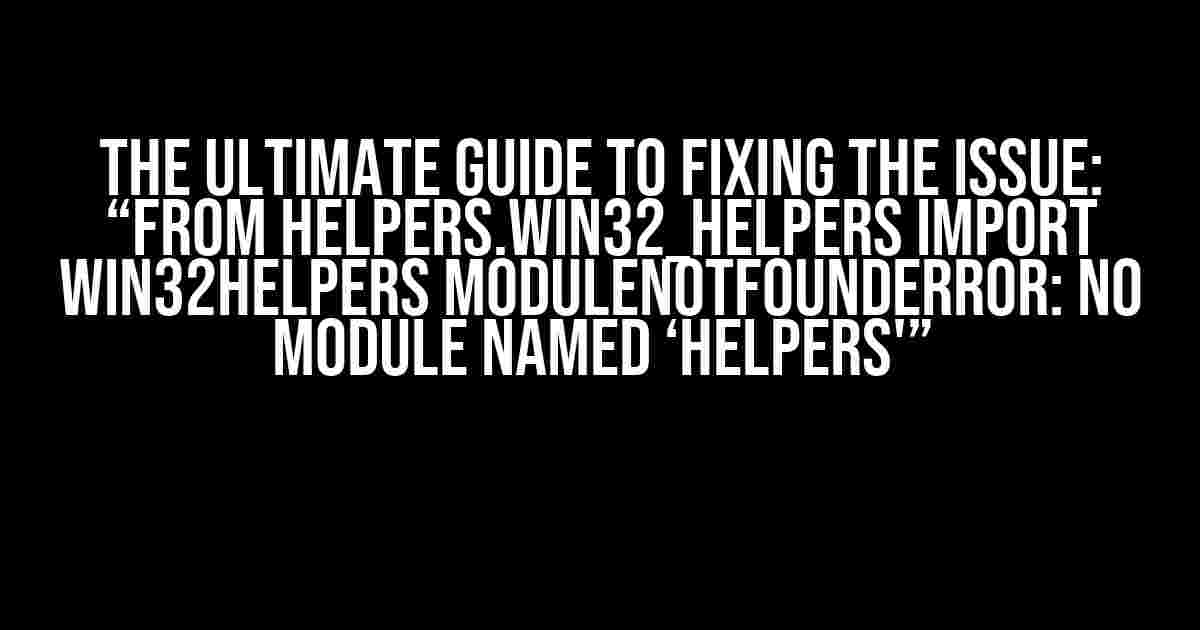Are you tired of encountering the frustrating error message “from helpers.win32_helpers import Win32Helpers ModuleNotFoundError: No module named ‘helpers'”? You’re not alone! This pesky issue has plagued many a developer, leaving them scratching their heads and wondering what went wrong. Fear not, dear reader, for we have got you covered. In this comprehensive guide, we’ll take you by the hand and walk you through the steps to fix this error once and for all.
What is the Error Message Telling You?
Before we dive into the solution, let’s take a closer look at the error message itself. The “ModuleNotFoundError: No module named ‘helpers'” error is quite straightforward: Python is telling you that it can’t find a module named ‘helpers’. But what does this mean, exactly?
The ‘helpers’ module is likely a custom module created by you or your team, containing a collection of utility functions or classes. When you try to import a specific class or function from this module, Python raises a ModuleNotFoundError because it can’t locate the ‘helpers’ module in its search path.
Common Causes of the Error
Before we fix the issue, let’s identify some common causes of the error:
- Incorrect Module Path: You might have placed the ‘helpers’ module in a location that’s not accessible by Python.
- Typos in Import Statements: A simple typo in your import statement can lead to this error.
- Missing __init__.py File: If the ‘helpers’ module is a package, you might be missing the __init__.py file, which is required for Python to recognize it as a package.
- Virtual Environment Issues: Problems with your virtual environment, such as incorrect activation or broken packages, can cause this error.
Step-by-Step Solution
Now that we’ve identified the potential causes, let’s get down to business and fix the issue!
Step 1: Verify the Module Path
First, ensure that the ‘helpers’ module is located in a directory that’s accessible by Python. You can do this by:
import sys print(sys.path)
This will display a list of directories that Python searches for modules. Check if the directory containing your ‘helpers’ module is in this list. If not, you’ll need to add it to your PYTHONPATH environment variable.
Step 2: Check for Typos in Import Statements
Double-check your import statements for any typos or incorrect capitalization. A single mistake can lead to this error.
from helpers.win32_helpers import Win32Helpers
Make sure the module name, package name, and class/function names match exactly.
Step 3: Add the __init__.py File (If Necessary)
If the ‘helpers’ module is a package, ensure that it contains an empty __init__.py file. This file is required for Python to recognize the directory as a package.
helpers/
__init__.py
win32_helpers.py
Even if your ‘helpers’ module is not a package, having an __init__.py file won’t harm anything.
Step 4: Activate Your Virtual Environment (If Applicable)
If you’re working within a virtual environment, ensure that it’s activated correctly. Deactivate and reactivate your virtual environment to see if that resolves the issue.
# Deactivate deactivate # Reactivate source venv/bin/activate
Replace venv with the name of your virtual environment.
Step 5: Reinstall Packages (If Necessary)
If you’re using a virtual environment, try reinstalling the required packages using pip:
pip install --force-reinstall -r requirements.txt
Replace requirements.txt with the name of your requirements file.
Troubleshooting Tips
Still encountering issues? Here are some additional troubleshooting tips to help you pinpoint the problem:
- Check the File System: Ensure that the ‘helpers’ module and its contents are correctly named and located.
- Use the Python Debugger: Run your script with the Python debugger (
python -m pdb script.py) to identify the exact line causing the error. - Check for Circular Imports: Verify that you’re not importing modules in a circular manner (e.g., module A imports module B, which imports module A).
Conclusion
By following these steps and troubleshooting tips, you should be able to fix the “from helpers.win32_helpers import Win32Helpers ModuleNotFoundError: No module named ‘helpers'” error. Remember to stay calm, methodically work through the solutions, and don’t hesitate to ask for help if needed.
| Error Solution | Description |
|---|---|
| Verify Module Path | Ensure the ‘helpers’ module is in a directory accessible by Python. |
| Check for Typos | Verify import statements for typos or incorrect capitalization. |
| Add __init__.py File | Include an empty __init__.py file in the ‘helpers’ module if it’s a package. |
| Activate Virtual Environment | Ensure your virtual environment is activated correctly. |
| Reinstall Packages | Reinstall required packages using pip if necessary. |
Don’t let this error hold you back from creating amazing Python projects. With patience, persistence, and the right guidance, you’ll be fixing this issue in no time!
Frequently Asked Questions
Still have questions? Here are some FAQs to help you out:
-
Q: What is the ‘helpers’ module?
A: The ‘helpers’ module is a custom module containing utility functions or classes created by you or your team.
-
Q: Why does Python raise a ModuleNotFoundError?
A: Python raises a ModuleNotFoundError when it can’t find a module in its search path.
-
Q: Can I fix this error in a virtual environment?
A: Yes, you can fix this error in a virtual environment by following the steps outlined in this guide.
We hope this comprehensive guide has helped you fix the “from helpers.win32_helpers import Win32Helpers ModuleNotFoundError: No module named ‘helpers'” error. Happy coding!
Frequently Asked Question
Are you struggling with the infamous “ModuleNotFoundError: No module named ‘helpers'” issue? Don’t worry, we’ve got you covered! Here are some frequently asked questions and answers to help you fix this pesky problem.
Q1: What’s causing the “ModuleNotFoundError: No module named ‘helpers'” error?
A1: This error occurs when Python can’t find the ‘helpers’ module, which is usually a part of the win32helpers package. This might be due to a missing or corrupted package installation, or incorrect import syntax.
Q2: How do I check if the ‘win32helpers’ package is installed?
A2: You can check if the package is installed by running the command “pip show pywin32” in your terminal or command prompt. If it’s not installed, you can install it using “pip install pywin32”.
Q3: What if I’ve installed the package, but the error still persists?
A3: In that case, try reinstalling the package using “pip uninstall pywin32” followed by “pip install pywin32”. This will ensure that the package is properly installed and configured.
Q4: How do I import the ‘helpers’ module correctly?
A4: Make sure you’re importing the module correctly using “from win32helpers import Win32Helpers”. Double-check that your import statement is correct, and you’re not missing any dependencies.
Q5: What if none of the above solutions work?
A5: If you’ve tried all the above solutions and the error still persists, try reinstalling Python, or checking for any conflicts with other packages. You can also try searching for specific solutions related to your Python version, OS, or environment.





